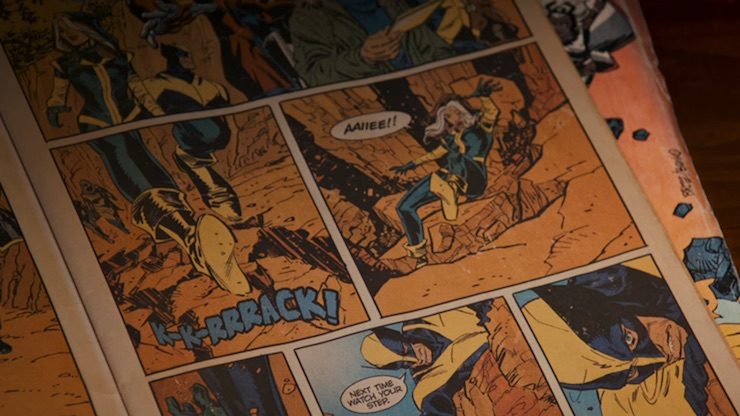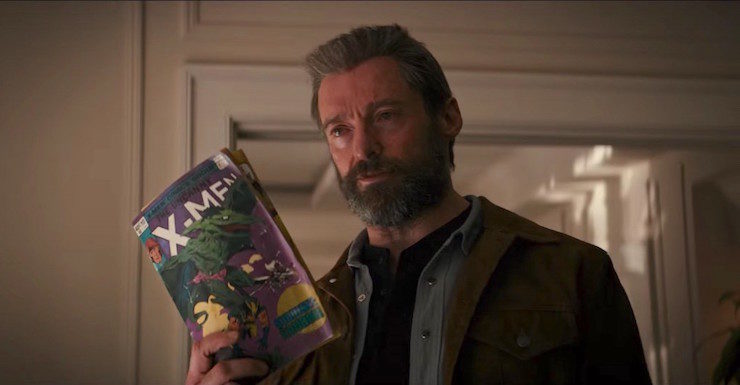The best thing about Logan is Patrick Stewart. No, it’s Dafne Keen. No, probably it’s Hugh Jackman, haggard and worn, playing this character with immense physicality and a strange grace.
You can make an argument for so many things being the highlight of Logan, from the atmosphere to that breathtaking scene with the train (aka James Mangold’s stellar audition to direct the next Fast and/or Furious film). But when the credits rolled, what struck me most was a different aspect of the film—a part unexpectedly both meta and moving.
The best thing about Logan is comic books.
It’s a comic book that tells Laura that there’s a world beyond Transigen—a world that might be safe for her. The X-Men are both fact and fiction in this future. They’re real people who’ve fought battles and endured trauma, and they are also the resulting, not entirely accurate, versions of themselves that appear in comics.
Logan, arguing that nothing happened like the comics say, has a point. The real stories, as best as we can tell, were much more tragic, with fewer survivors and fewer heroic figures. He’s not a hero or a champion. He’s been hiding out in his own dirty, broken refuge, one he seems to have built himself. No one gave him asylum or pointed him toward a place that would take him in and clean his wounds.
But Logan also misses the point. The place Laura yearns for, the Eden in her comics, looks futuristic, perfect, clean. It’s a promise: here, you’ll be with people like you. We’ll welcome you.
Does this Eden exist? No. But the promise of it, the story the comics tell about its existence? That’s real. The story is what matters; the story tells the kids that this place is possible.

There are a lot of stories about the importance of stories—books, talks, lectures, essays, you name it. One of my favorites is a Franny Billingsley’s Chime, a novel about the story you tell yourself about yourself, and how it builds pathways in your brain. If you tell yourself a story about how you’re a failure, or dangerous, or broken, can you change those things without telling yourself a new story? The heroine of Chime, Briony, knows she’s a witch. She’s certain of it, and because she’s a witch, certain things are her fault. It’s a story she can’t let go of; it explains her world, and why it is the way it is.
Logan has a story about himself, and it’s not a happy one: it’s a story about being alone, and dangerous, and scraping by. Charles Xavier has a story about himself, and one of the most crushing moments in Logan comes when he realizes that his story took a terrible turn into a darker tragedy than he remembered. He lost the thread, and he doesn’t have time to do anything about it.
But Laura’s story is still unformed. Does she know any stories besides the comic she keeps close in her backpack? What story do you tell yourself if you’re raised in a world without them? At what point did those X-Men comics make their way into her possession, showing her that there was more to the world than what she’d been raised with?
It’s not much of a stretch to reach from the importance of an X-Men comic in a young mutant’s life to the importance of representation in stories in our world—and Logan makes that connection clear with its next generation of mutants, a gloriously diverse bunch of kids. There was no Eden in North Dakota, so they built their own. They had no reason to believe they couldn’t. Mutants built it; they’re mutants. The power of seeing yourself in a story is very real for these kids.
The comic books that Laura carries with her represent a haven, a future, that the kids make for themselves. And this represents the best of what comics can do: tell us that more things are possible, that we can be more, and better. The comics in the movie serve the very purpose that the best comics and stories have been serving for ages. They entertain, sure. But they also inspire.
Molly Templeton is Tor.com’s publicity coordinator. She also writes about movies for the Eugene Weekly, and she will read basically any story-about-stories you put in front of her.










